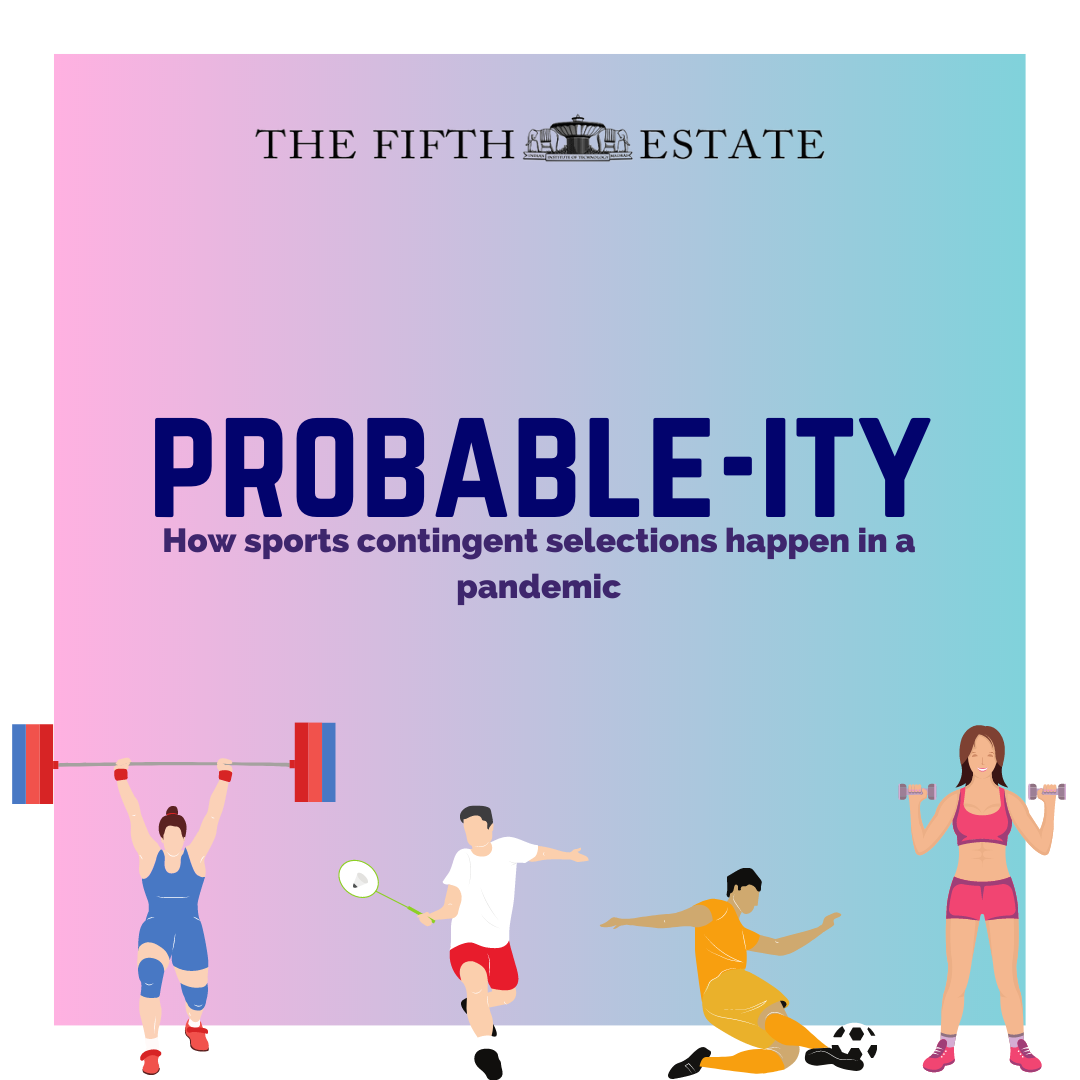Edited by Sajusha Ashok
Design by Ramana
Football is the world’s most popular sport. In India, though it comes second to cricket, it is still followed eagerly by millions. Screenings of EPL (English Premier League) or UCL (UEFA Champions League) matches draw large crowds at restaurants or open air theatres, while the ISL (Indian Super League) sells out stadiums and attracts viewership well into the tens of millions. But what about football fandom in our very own insti? We interviewed different football fans to learn about the football culture in IITM.
The basics: how did you get into football?
Aahana Hegde became interested in football in 8th grade “after watching the movie Bend it Like Beckham”. She used to support FC Barcelona and follow La Liga (the Spanish football league). Now, though she doesn’t have enough time to watch full matches, she keeps up with football by watching match highlights.
Kshitij Shah got into football around 2014-15, when he began to follow the scores. He started properly watching matches about six years ago, and has supported Manchester United for as long. His cousin’s interest in football, and specifically in the Club, helped him become interested in it. As for countries, he doesn’t expressly support any country other than India; he says he keeps up with World Cups and decides who to follow each cycle.
Others, like Santosh Sriram, have followed football for far longer. Santosh got into the sport in around 2006, just around when Zinedine Zidane retired from his club career. He has supported Real Madrid ever since; even after a break in between, he couldn’t fathom supporting any other club.
There are fans who follow their teams religiously and stick with them through thick and thin, regardless of the overall constitution of the team. Other fans have the same commitment, but to an individual player. Debates about whether Messi or Ronaldo is better can get heated and expressive in the same way that passionate arguments between Liverpool fans and Manchester United do.
Aditya Mohapatra says,
“I got to know about football around the 2010 World Cup… there was hype about the Spain national team” (that year’s winners).”But I didn’t really understand the game back then. I really got into football during the 2014 FIFA World Cup.”
He cites Lionel Messi and his Golden Ball winning performance of that tournament as the reason he became interested in football. He remembers supporting Argentina to the final that year, and his disappointment when they lost. He stuck with Messi and his teams, though. “I support Barcelona (Messi-Suarez-Neymar in attack, and Xavi-Iniesta-Busquets in midfield.” He started watching club football around the same time, and has watched almost every Barcelona match in La Liga and the UCL since 2018.
Football fandom as a social activity
In many friend groups, football is a social activity. On the eve of important matches, Instagram stories abound with pictures of groups huddled around laptops or TVs, eager for the match to begin.
Aditya says,
“In insti there is [a] pretty nice football culture… I group-watch matches with friends. Sometimes I watch alone as a personal activity but the popular matches, we watch in groups.”
Some friend groups all support the same team and follow them through each game week. Other varied groups of fans watch big games together, or ones where each of the teams playing has a supporter within the group.
Aahana concurs with Aditya. “Football is very popular here, arguably the most watched sport after cricket. I’ve met a lot of die hard fans. People do watch finals and big matches together. Sometimes, matches are screened at OAT.” And indeed, those who watch matches together derive even more enjoyment from experiencing the highs and lows of their team’s journey together, or perhaps bickering about referee decisions with a rival fan.
Santosh, who has graduated, reminisces about his time in insti and how he used to collect the key to the TV room hours prior to a match, so groups of up to 60 people could congregate to watch the evening’s game.
“There was too much banter that would go on… and the root cause was most likely me!”
After his freshie year, most of his friend group split up into separate hostels and the social aspect of watching games together diminished. Only during his final semester did the SOC start screening matches in a classroom, and Covid restrictions meant only a few matches were allowed to be screened. But those few games afforded a welcome opportunity for the “banter” to start up again.
What about WhatsApp groups, online fandom and fantasy leagues?
Kshitij says there is an insti-wide WhatsApp group for football. Formed long ago, it initially stuck to general football, such as institute activities and announcements. Later, it became a space for fans to banter about teams and players or debate about match results, with activity reaching high and even spammy levels.
Santosh says that there are a few cliques, based on team or region, which are quite active. Most people have their own smaller WhatsApp groups with friends too, which offer different environments to discuss games. He does note that in his opinion, while real life meetups are really fun, online groups don’t fully make up for that experience. He also says, however, that there isn’t too much of a difference between online and offline fandom, except “whether you are willing to face the humiliation if your team loses. Online, all you need to do is leave the call.”
Aahana, meanwhile, feels there is a big difference.
“Yes there’s a big difference, streaming matches together online is fun, but sitting together and cheering for your team in person is a whole other experience.”
A lot of fans found that the experience of watching matches together over a Zoom call or a GMeet simply did not compare to sitting in a room together and yelling at the screen. Many felt that the energy of the room, the buzz, banter and camaraderie, could not be replicated online.
For Ananya Prakash, though, online fandom is a very positive experience that sparked her interest in football, albeit perhaps in a slightly different way. She says she got into football recently, in 2021. She has always been involved in cricket, and on Twitter she found a welcoming football community. “I could have conversations about the women’s game which the community would understand, unlike real life where only a handful actively followed the women’s game like I did.” She started following Chelsea soon after that, and the excitement of the Olympics cemented her interest in football.
Aditya says that the main group he’s in is quite active, with fans of many different clubs. They tend to discuss lineups, matches and transfer news. They also discuss something else that’s interesting: fantasy league. A fantasy league is a game in which people can make their own teams of actual players and accumulate points based on real-life performances.
There is an insti-wide fantasy league, but many individual friend groups have their own smaller leagues as well. The two most popular kinds of active leagues in insti are for the EPL and the UCL. Some people take the league very seriously and track goals, assists, clean sheets and their corresponding values in virtual points religiously, trying to stay ahead each week. Others, meanwhile, do it “as timepass” or mostly for fun. Kshitij jokes that he doesn’t participate as much in fantasy leagues because he can’t “live with hoping that Liverpool [the rival team] players score!”
Do you play?
A lot of football fans do play football. From NSO to the insti team, and from department matches to Schroeter, there are enough opportunities to get involved with the game. Some play for fun or during hostel tournaments, while others practice rigorously to be a part of the official team. Aahana says she was involved with NSO football, and now trains every weekend along with other girls in the hopes of getting onto insti’s first ever women’s football team.
The Beautiful Game
Football, as one of the world’s best loved sports, has a large following in insti, be it hardcore, devoted fans or casual viewers who keep up with the scores. It can be the cause of rancorous arguments and riotous banter, and it can also bring people together. At the end of the day, the popularity of football is here to stay. There will always be a dedicated crowd turning up to whichever matches the SOC screens, bantering about who the GOAT is in their WhatsApp groups, agonising over stats for their fantasy leagues, or just sitting back and enjoying the atmosphere of a good game.





